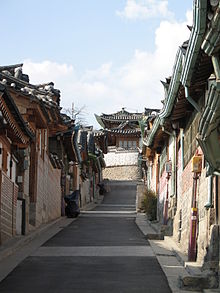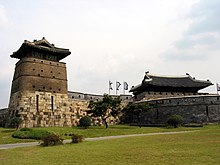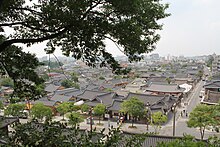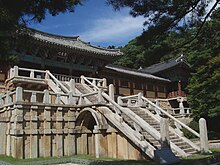Tourism in South Korea
Tourism in South Korea refers to the tourist industry in the Republic of Korea. In 2012, 11.1 million foreign tourists visited South Korea, making it the 20th most visited country in the world, and the 6th most visited in Asia. Most non-Korean tourists come fromJapan, China, Taiwan and Hong Kong. The recent popularity of Korean popular culture, often known as the "Korean Wave", in these countries has increased tourist arrivals.Seoul is the principal tourist destination for visitors; popular tourist destinations outside of Seoul include Seorak-san national park, the historic city of Gyeongju and subtropical Jeju Island. Traveling toNorth Korea is not normally possible without a special permission, but in recent years organized group tours have allowed groups of South Korean citizens to visit Mount Kumgang.
- International and Domestic tourism
- 2Arrivals by country
- 3Tourist attractions
- 3.1Major tourist destinations
- 3.1.1Seoul
- 3.1.2Busan
- 3.1.3Daegu
- 3.1.4Incheon
- 3.1.5Gwangju
- 3.1.6Daejeon
- 3.1.7Gyeonggi Province
- 3.1.8Gangwon Province
- 3.1.9North Chungcheong Province
- 3.1.10South Chungcheong Province
- 3.1.11North Jeolla Province
- 3.1.12South Jeolla Province
- 3.1.13North Gyeongsang Province
- 3.1.14South Gyeongsang Province
- 3.1.15Jeju Special Self-governing Province
- 3.1Major tourist destinations
- 4Events
- 5See also
- 6References
- 7Further reading
- 8External links
International and Domestic tourism
The majority of the South Korean tourist industry is supported by domestic tourism. Thanks to the country's extensive network of trains and buses, most of the country lies within a day's round trip of any major city. International tourists come primarily from nearby countries in Asia. Japan, China, Hong Kong and Taiwan together account for roughly 75% of the total number of international tourists.In addition, the Korean Wave has brought increasing numbers of tourists from Southeast Asia and India. The Korea Tourism Organization (KTO) is targeting 100,000 arrivals from India in 2013.
International tourists typically enter the country through Incheon International Airport, near Seoul, which was found to be the world's best airport in 2006. Also international airports in Busan and Jeju are frequently used.
Statistics
| Year | Number of international tourists arriving in S. Korea |
|---|---|
| 1970 | 173,335 |
| 1980 | 976,415 |
| 1990 | 2,958,839 |
| 2000 | 5,321,792 |
| 2005 | 6,022,752 |
| 2008 | 6,890,841 |
| 2009 | 7,817,533 |
| 2010 | 8,797,658 |
| 2011 | 9,794,796 |
| 2012 | 9,190,000 |
| 2013 | 12,175,550 |
| 2014 | 14,201,516 |
| 2015 | 13,231,651 |
In 2013, travel and tourism (domestic and international) directly contributed KRW26.7 trillion to South Korean GDP and directly supported 617,500 jobs in the country.
Arrivals by country
Most visitors arriving to South Korea in 2015 for tourism by nationality:
| Rank | Country | Number |
|---|---|---|
| 1 | 4,712,133 | |
| 2 | 1,742,531 | |
| 3 | 573,194 | |
| 4 | 511,703 | |
| 5 | 504,233 | |
| 6 | 305,953 | |
| 7 | 199,705 | |
| 8 | 142,879 | |
| 9 | 138,257 | |
| 10 | 121,380 | |
| Total tourists | 10,135,489 | |
| Total visitors | 13,231,651 |
Japan
Since Lee Myung-bak's visit to the Liancourt Rocks and demand for the emperor’s apology in 2012, the Japanese public's image of South Korea deteriorated significantly. Japanese tourists to South Korea declined to half from 3.5 million in 2012 to 1.8 million in 2015 while South Korean tourist doubled from 2 million in 2012 to 4 million in 2015.
Tourist attraction
South Korea's historical tourist attractions include the ancient capitals of Seoul, Gyeongju and Buyeo.
Some natural landmarks include the peaks of the Baekdudaegan, particularly Seorak-san and Jiri-san, the caves of Danyang andHwanseongul, and beaches such as Haeundae and Mallipo.
Apart from Jeju island, there are many smaller islands. Excursion ferries are quite common along the south and west coasts and also to Ulleung-do Island, off the east coast. Limited tourism mainly by South Koreans to the Liancourt Rocks (Dokdo) has grown in recent years as a result of the political status of the rocks.
Many local districts hold annual festivals, such as the Boryeong Mud Festival and the Cheongdo Bullfighting Festival.
Major tourist destinations
Seoul
- Gyeongbokgung Palace
- Changdeokgung Palace
- Deoksugung Palace
- Gwanghwamun Square
- Fortress Wall of Seoul
- 63 Building
- N Seoul Tower
- Bukchon Hanok Village
- War Memorial of Korea
- Jogyesa Temple
- National Museum of Korea
- Cheonggyecheon
Busan
- Haeundae Beach
- Beomeosa Temple
- Haedong Yonggungsa Temple
- Geumjeongsanseong Fortress
- Dongnaeeupseong Fortress
- Dongnae-hyangyo Confucian Academy
- Chungnyeolsa Shrine
- Gukjae Market
Daegu
- Palgongsan Mountain
- Donghwasa Temple
- Gyesan Catholic Church
- Dalseong Park
- Gyeongsang-gamyeong Park
- Old House of Lee Sang-hwa
- Daegu-hyanggyo Confucian Academy
Incheon[
- Songdo Central Park
- Jeondeungsa Temple
- Chamseongdan Altar
- Chinatown
- Wolmido Island
- Gwangseongbo Fortress
Gwangju
- May 18th National Cemetery
- Mudeungsan National Park
- Gwangju Folk Museum
- Gwangju National Museum
- Jeungsimsa Temple
Daejeon
- Hanbat Arboretum
- Yuseong Hot Springs
- Expo Park
- Daejeon Museum of Art
Gyeonggi Province
- Suwon — Suwon Hwaseong Fortress
- Gwangju(Gyeonggi) — Namhansanseong Fortress
- Kuri — Donggureung Tomb Cluster
- Paju — DMZ, Panmunjeom
- Yongin — Everland, Korean Folk Village, Daejanggeum Park
- Gapyeong — The Garden of Morning Calm
Gangwon Province
North Chungcheong Province
- Boeun — Beopjusa Temple, Songnisan National Park, Samnyeonsanseong Fortress, Seon Byeong-guk House, Songnisan National Park
- Danyang — Guinsa Temple, Gosu Cave, Danyang Ondal Cave, Dodamsambong Peaks
- Cheongju — Cheongju National Museum, Cheongnamdae, Sangdangsanseong Fortress
- Jincheon — Bell Museum, Botapsa Temple
South Chungcheong Province
- Gongju — Tomb of King Muryeong, Gongsanseong, Magoksa Temple, Donghaksa Temple, Gapsa Temple, Seonhwadang, Gongju National Museum
- Buyeo — Buyeo National Museum (Gilt-bronze Incense Burner of Baekje), Five storied stone pagoda of Jeongnimsa Temple site, Gungnamji, Nakhwa-am, Muryangsa Temple, Baekje Royal Tombs(Neungsan-ri Ancient Tombs)
- Cheonan — The independence hall of Korea, Gakwonsa Temple
- Seosan — Rock-carved triad buddha, Haemieupseong Fortress
- Nonsan — Mireuk-bosal at Gwanchoksa Temple
North Jeolla Province
- Jeonju — Jeonju Hanok Village, Jeondong Catholic Church, Gyeonggijeon Shrine, Hanji Museum, Royal Portrait Museum, Jeonju Gaeksa, Jeonjuhyanggyo Confucian School
- Namwon — Gwanghallu Pavilion, Chunhyang Theme Park, Manin Cemetery of Righteous Fighters, Silsangsa Temple, Gyoryong Sanseong Fortress
- Gochang — Gochangeupseong Fortress, Seonunsa Temple, Pansori Museum
- Iksan — Mireuksaji Pagoda,
- Gimje — Geumsansa Temple
- Gunsan — Hirotsu House, Dongguksa Temple
- Buan — Tapsa Temple, Byeonsanbando National Park
South Jeolla
- Yeosu — Yeosu Jinnamgwan, Hyangiram, Yi Sun Shin Square
- Suncheon — Songgwangsa Temple, Seonamsa Temple, Nagan Eupseong Folk Village
- Mokpo — Mokpo Modern History Museum, Gatbawi Rock, Yudal Mountain
- Haenam — Ttangggut (End of the Land) Village, Mihwangsa Temple
- Gurye — Hwaeomsa Temple
- Damyang — Damyang Juknokwon, Metasequoia-lined Road, Soswaewon Garden
- Boseong — Boseong Green Tea Field Daehan Dawon
North Gyeongsang Province
- Gyeongju — Bulguksa Temple, Seokguram, Anapji Pond, Gyeongju National Museum, Cheonmachong Tomb, Cheomseongdae Observatory, Yangdong Folk Village, Bunhwangsaji (Bunhwangsa Temple Site)
- Andong — Hahoe Folk Village, Hahoe Mask Museum, Dosanseowon Confucian School, Byeongsanseowon Confucian School, Wollyeongo Bridge
- Yeongju — Buseoksa Temple
- Mungyeong — Mungyeong Saejae Provincial Park
- Ulleung — Dokdo Island
South Gyeongsang Province
- Yangsan — Tongdosa Temple
- Hapcheon — Haeinsa Temple
- Tongyeong — Dongpirang Wall Painting Village
- Jinju — Jinjuseong, National Jinju Museum
- Geoje — Historic Park of Geoje POW Camp, Sinseondae
- Namhae — Gacheon Daerangi Village, German Village
- Gimhae — Tomb of King Suro
- Changnyeong — Upo Wetland
Jeju Special Self-governing Province
- Mount Halla
- Cheonjeyeon and Cheonjiyeon waterfalls
- Hallim Park
- Yakcheonsa Temple
- Manjanggul
- Jeju Stone Statue Park
Events
South Korea has hosted many international events, including the 1988 Summer Olympics, the 1993 Taejon Expo, the 2002 FIFA World Cup (jointly hosted with Japan), the 2005 APEC conference, the 2010 G-20 Seoul summit and the 2014 Asian Games. The 2018 Winter Olympics will be held in Pyeongchang.













